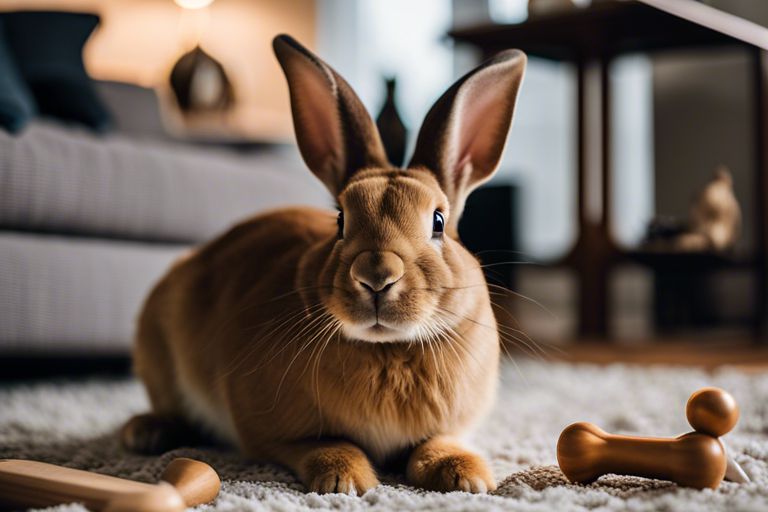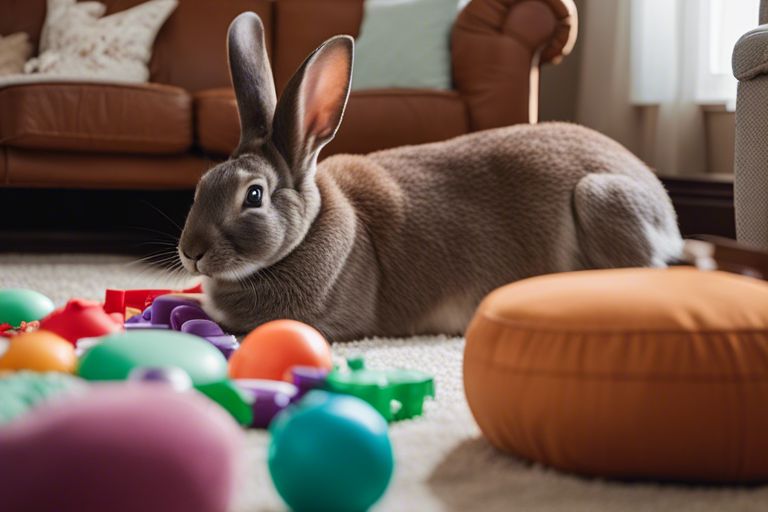Have you noticed your Flemish Giant exhibiting destructive behaviors such as chewing on furniture or digging up carpets? While these gentle giants are known for their calm and friendly demeanor, they are not immune to exhibiting destructive behaviors. It’s important to understand why these behaviors occur and how you can effectively manage them to ensure the well-being of your beloved pet. In this blog post, we will discuss the potential reasons behind destructive behaviors in Flemish Giants and provide you with practical tips on how to address and manage them.
Key Takeaways:
- Flemish Giants can exhibit destructive behaviors such as digging, chewing, and scratching due to boredom or lack of stimulation.
- These destructive behaviors can be managed by providing ample toys, chew items, and mental stimulation to keep them occupied.
- Regular exercise and playtime are essential in preventing destructive behaviors in Flemish Giants.
- Training and positive reinforcement can also help deter destructive behaviors in Flemish Giants.
- If destructive behaviors persist, it is important to seek guidance from a professional veterinarian or animal behaviorist for further management and training.
Behavior and Potential Destructiveness
If you are considering adopting a Flemish Giant rabbit, it’s important to understand their behavior and potential for destructive tendencies. While these gentle giants are typically docile and easy-going, there are instances where they may exhibit destructive behaviors. Understanding the reasons behind such behaviors and knowing how to manage them is crucial for ensuring a harmonious relationship with your pet.
Common Destructive Behaviors in Flemish Giants
One common destructive behavior exhibited by Flemish Giants is chewing. These rabbits have a natural instinct to chew, and if not given appropriate outlets, they may resort to chewing on furniture, wires, or other household items. Additionally, digging is another common destructive behavior, especially if the rabbit is kept in a confined space without proper stimulation.
Factors Influencing Negative Behavior
There are several factors that can influence negative behavior in Flemish Giants. These include inadequate space, lack of mental stimulation, loneliness, and stress. Any of these factors can lead to destructive behaviors as the rabbit attempts to cope with its environment.
- Inadequate space: If your Flemish Giant does not have enough room to roam and exercise, it may become frustrated and exhibit destructive behaviors.
- Lack of mental stimulation: Rabbits, like the Flemish Giant, need mental stimulation to prevent boredom and subsequent destructive behaviors.
- Loneliness: If your rabbit is left alone for long periods, it may become anxious and resort to destructive behaviors as a way of coping with the isolation.
- Stress: Any sudden changes or stress-inducing situations can lead to destructive behaviors in Flemish Giants.
Any of these factors can contribute to your Flemish Giant’s destructive behaviors, so it’s important to address them proactively to prevent such issues from arising.
By understanding the common destructive behaviors and the factors influencing negative behavior in Flemish Giants, you can take proactive measures to prevent and manage such behaviors. Providing proper housing, enrichment, and companionship can go a long way in promoting positive behaviors and a harmonious relationship with your gentle giant.
Management Strategies for Destructive Behavior
Assuming you have noticed destructive behaviors in your Flemish Giant, it is important to address the issue promptly to prevent it from becoming a habit. You can start by understanding the reasons behind the destructive behaviors. Destructive behavior in rabbits, including Flemish Giants, can be due to various reasons such as boredom, lack of exercise, and stress. By identifying the underlying cause, you can implement effective management strategies to address the behavior. For more information on destructive behavior in rabbits, you can visit Destructive Behavior in Rabbits.
The Role of Socialization and Obedience Training
Socialization and obedience training play a crucial role in managing destructive behavior in Flemish Giants. By socializing your rabbit from a young age, you can help them become accustomed to human interaction and other pets, reducing stress and anxiety that may lead to destructive behaviors. Obedience training can also be beneficial in teaching your rabbit good behavior and providing mental stimulation. By incorporating positive reinforcement techniques, you can encourage desirable behaviors and discourage destructive tendencies.
Creating a Flemish Giant-Friendly Environment
Creating a Flemish Giant-friendly environment is essential for managing destructive behaviors. Ensure that your rabbit has ample space to exercise and explore to prevent boredom. Provide a variety of toys, tunnels, and hiding spots to keep them mentally stimulated and engaged. Additionally, rabbit-proofing your home by securing electrical cords, valuable items, and restricting access to potentially harmful areas can help prevent destructive behaviors and keep your rabbit safe.
Health and Wellness Considerations
Lastly, it is important to consider the health and wellness needs of your Flemish Giant rabbit. By taking proactive steps to address potential health concerns and promoting overall wellness, you can help ensure a happy and thriving rabbit.
The Importance of Routine Veterinary Check-ups and Vaccinations
Regular veterinary check-ups and vaccinations are essential for maintaining the health of your Flemish Giant rabbit. These check-ups can help detect any potential health issues early on, allowing for prompt treatment and a higher likelihood of successful outcomes. Vaccinations are also crucial in protecting your rabbit from common diseases and illnesses. By staying up to date with vaccinations, you can provide your rabbit with an extra layer of protection against serious health threats.
Grooming, Shedding, and Parasite Prevention
Proper grooming is important for your Flemish Giant rabbit’s overall health and well-being. Regular grooming can help to prevent mats and tangles in their fur, as well as reducing the risk of skin infections. Additionally, shedding is a normal part of a rabbit’s life, but excessive shedding could be a sign of an underlying health issue. As a responsible rabbit owner, you should also be diligent in parasite prevention, as these pesky pests can cause discomfort and potential health issues for your rabbit.
Advanced Solutions and Alternatives
Now that you have tried the basic solutions to manage destructive behaviors in Flemish Giants, it may be time to consider more advanced options. Here are some alternative techniques and remedies for addressing and managing destructive behaviors in your pet rabbit:
- Behavioral Remedies: Positive Reinforcement and Clicker Training
- Neutering: Behavioral and Health Implications
Behavioral Remedies: Positive Reinforcement and Clicker Training
If you have tried basic training methods and are still struggling with your Flemish Giant’s destructive behaviors, positive reinforcement and clicker training can be effective ways to address these issues. By rewarding your rabbit with treats and praise for good behavior, you can encourage them to repeat those behaviors. Clicker training, which involves using a small clicking device to mark desired behaviors, can also be a valuable tool in teaching your rabbit appropriate conduct. By implementing these methods consistently and patiently, you can help shape your rabbit’s behavior in a positive direction.
Neutering: Behavioral and Health Implications
Neutering your Flemish Giant can have significant effects on their behavior and overall health. Not only can it help reduce aggressive and destructive tendencies in male rabbits, but it can also prevent certain health issues and contribute to a longer, healthier life. Additionally, neutering can help mitigate the risk of unwanted pregnancies and reduce the potential for certain reproductive-related diseases. If you are considering this option, it is important to consult with a veterinarian to fully understand the implications and ensure that it is the right decision for you and your rabbit.
In conclusion, it is crucial to explore advanced solutions and alternatives when addressing destructive behaviors in Flemish Giants. By incorporating positive reinforcement and clicker training, as well as considering the option of neutering, you can effectively manage and improve your rabbit’s behavior. Remember, each rabbit is unique, so it’s essential to find the right approach that works for you and your furry friend.

The Management of Destructive Behaviors in Flemish Giants
The destructive behaviors exhibited by Flemish Giants can be managed through several strategies. First, providing adequate mental and physical stimulation is crucial to prevent boredom and subsequent destructive behavior. This can be achieved through ample space, interactive toys, and regular exercise. Additionally, reinforcing positive behaviors through training and rewarding can help redirect destructive tendencies. Furthermore, providing appropriate chewing materials and ensuring a safe and secure environment can help minimize destructive behaviors. By implementing these management strategies, you can effectively address and prevent destructive behaviors in Flemish Giants.
Frequently Asked Questions about Flemish Giants and Destructive Behaviors
Q: Can Flemish Giants exhibit destructive behaviors?
A: Yes, Flemish Giants are known to exhibit destructive behaviors such as digging, chewing, and clawing. This is often a result of boredom, lack of stimulation, or territorial instincts. It’s important to provide them with enough mental and physical stimulation to prevent destructive behavior.
Q: How can destructive behaviors in Flemish Giants be managed?
A: To manage destructive behaviors in Flemish Giants, it is crucial to provide them with a spacious and enriched environment. This can include toys, tunnels, and platforms for them to explore. Additionally, regular exercise, mental stimulation, and social interaction with their human companions can help alleviate destructive tendencies. Providing appropriate chew toys and regular nail trimming can also prevent excessive chewing and clawing.
Q: Are there any training techniques to discourage destructive behaviors in Flemish Giants?
A: Positive reinforcement training techniques can be effective in discouraging destructive behaviors in Flemish Giants. Using rewards and praise when they exhibit desirable behaviors, and redirecting their attention when they engage in destructive behaviors, can help them learn appropriate behavior. Consistency, patience, and understanding their individual needs are key in training Flemish Giants to exhibit non-destructive behaviors.
